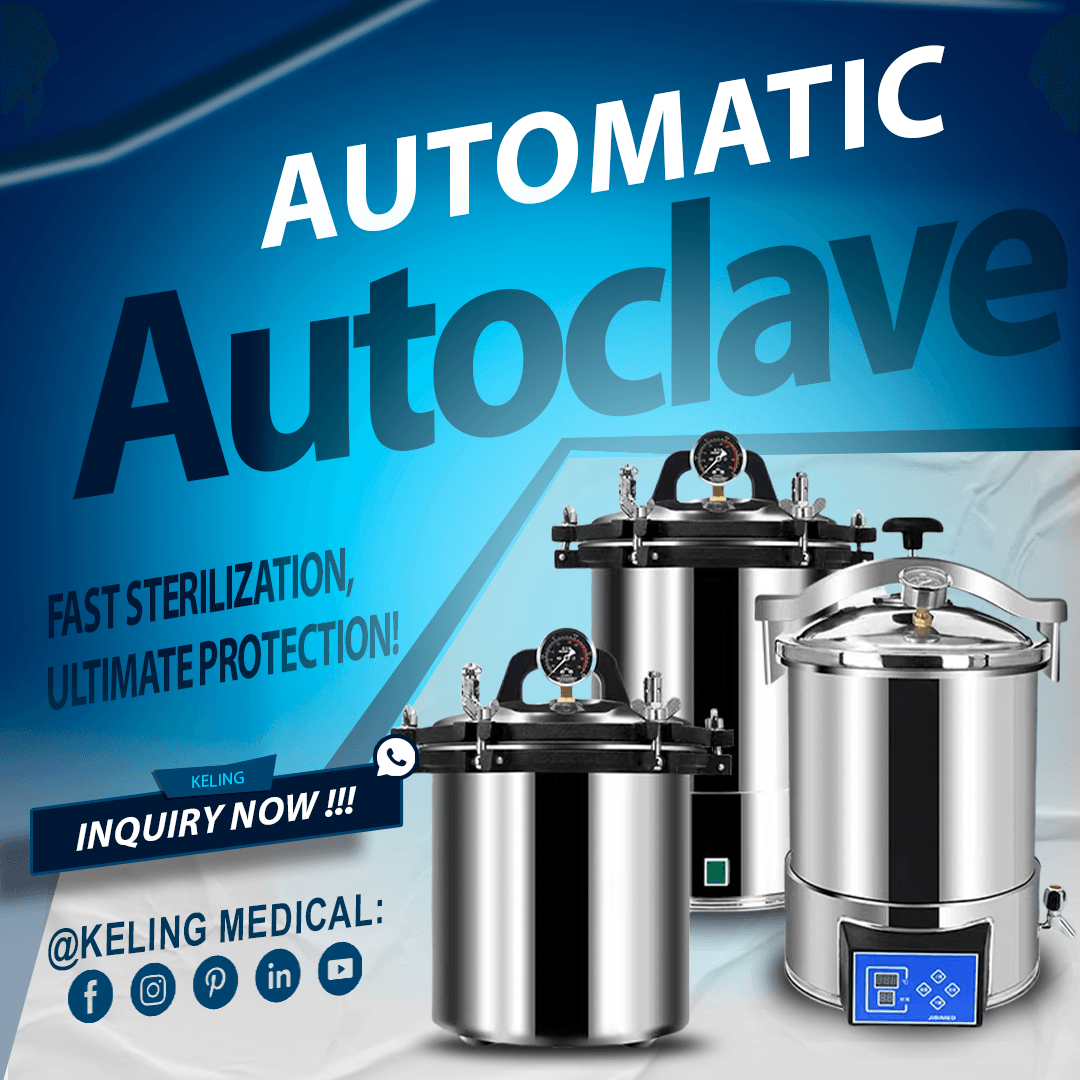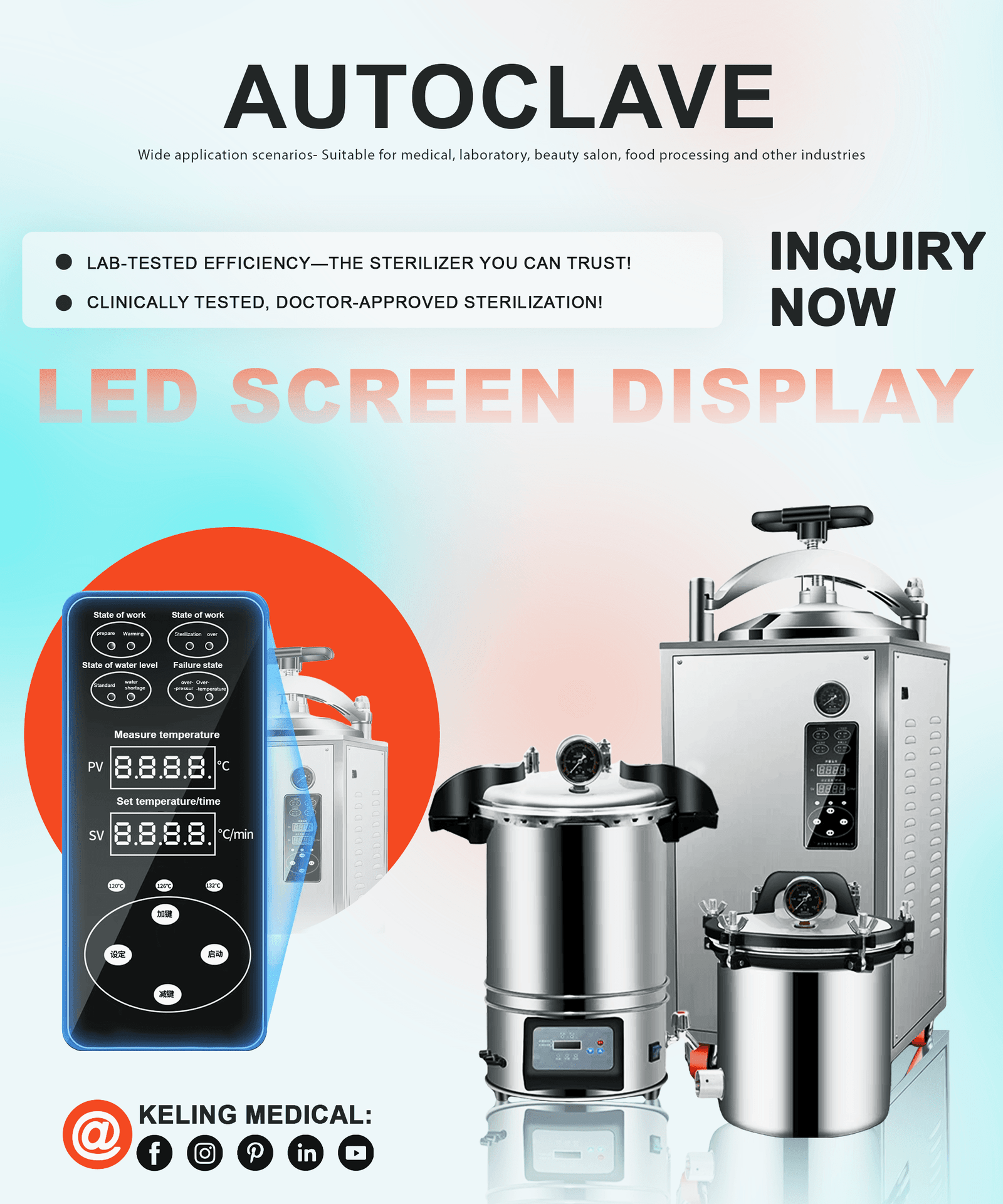
Reliable sterilization depends fundamentally on proper temperature management inside autoclaves. Supply chain professionals who understand temperature settings can deliver equipment that meets rigorous safety requirements to their clients. This article investigates autoclave temperature science and demonstrates its importance in infection control while presenting methods to address healthcare providers’ requirements.
Understanding autoclave temperature helps explain why it plays a critical role in the sterilization process.
The autoclave temperature indicates the steam heat level used under pressure to sterilize medical and veterinary instruments and equipment. The temperature range of 121°C (250°F) to 134°C (273°F) is essential because it destroys microorganisms and their highly resistant spores. Autoclaves maintain essential hygiene standards in healthcare facilities by delivering thorough sterilization through precise temperature control.
Medical distributors must recognize the importance of autoclave temperature to ensure they supply devices that fulfill their clients’ specific requirements. The sterilization process remains effective and safe only when both small clinics and large hospitals can maintain the necessary temperature levels. Understanding autoclave temperature requirements allows distributors to become trusted infection prevention partners which boosts their market value in the medical equipment industry.
An autoclave works effectively when it can maintain high temperatures under pressure. Steam penetrates materials at 121°C, resulting in pathogen destruction through moist heat sterilization by denaturing proteins and disrupting cellular structures. Sterilization processes become more efficient with increased temperatures like 134°C which deliver results in less time and thus suit busy operations well. Through heat and steam working together with pressure it becomes possible to eliminate even the most resilient spores while ensuring reusable instruments remain safe.
Most autoclaves operate at two primary temperature settings: Standard autoclave cycles operate at 121°C for durations between 15 to 30 minutes whereas faster cycles function at 134°C with typical durations ranging from 3 to 10 minutes. Specific pressure levels between 15 and 30 psi pair with these settings to achieve steam saturation and effective sterilization. Distributors need to understand these parameters to supply equipment that meets different client demands, including smaller practices needing extended cycles and larger facilities requiring quick turnaround times.
The sterilization process produces dependable outcomes only when temperature remains steady throughout the entire cycle. Temperature variations and poor heat levels can produce incomplete sterilization cycles that create serious dangers within medical environments. Advanced sensors and controls in modern autoclaves allow precise temperature monitoring and stabilization which distributors should consider important when selecting equipment to meet client expectations and safety regulations.
Healthcare and veterinary facilities are required to follow strict sterilization protocols to both prevent infections and comply with regulatory standards. Achieving regulatory compliance relies heavily on autoclave temperature because it determines how effectively pathogens are destroyed. Distributors providing precise temperature control devices enable their clients to follow local and international regulations thereby establishing trust and credibility in their market.
The sterilization needs of healthcare facilities vary depending on their physical size and operational capacity as well as the diversity of medical procedures they perform. A small veterinary clinic focuses on cost-effective and simple temperature controls whereas large hospitals need fast cycles at elevated temperatures. Distributors who recognize these differences can develop product assortments that meet their customers’ diverse requirements and expand their market presence.
Reusable medical instruments present an economical option compared to disposable ones which can be safely reused through sterilization at appropriate temperatures. Through the provision of autoclaves with dependable temperature capabilities distributors help healthcare facilities lower operational expenses while maintaining safety standards. Showing this advantage makes a compelling pitch to procurement managers.
Medical distributors gain significant advantages from maintaining the optimal autoclave temperature because it ensures the sterilization process prevents infections and protects everyone in healthcare facilities.
The main benefit of proper autoclave temperature maintenance lies in its ability to prevent infections. Effective sterilization procedures protect patients, staff, and animals from cross-contamination risks that healthcare facilities must manage. Medical equipment distributors who supply devices with reliable temperature control systems help create safer healthcare environments while establishing themselves as dependable suppliers.
Autoclaves equipped with advanced temperature regulation features help businesses stand out in competitive markets. The ability to customize cycles and design temperature-specific devices serves as a unique selling point that can draw in a broader range of customers. Distributors can use product differentiation to establish more robust partnerships with healthcare and veterinary professionals.
Proper temperature sterilization decreases dependence on single-use items which supports healthcare’s sustainable development goals. Autoclaves provide eco-friendly advantages that distributors can promote to facilities working to cut waste and shrink their environmental impact. The sustainable focus appeals to clients who implement green initiatives as their primary goal.
Important factors need evaluation when choosing autoclaves that provide dependable temperature control.
Selecting autoclaves requires strict adherence to quality standards and regulatory requirements. Distributors need to choose medical devices that adhere to international standards to guarantee precise temperature performance and safety. Certifications along with third-party verifications ensure dependable performance which safeguards both client interests and your business reputation from possible problems.
To maintain a reliable supply of top-quality autoclaves businesses must collaborate with dependable manufacturers. When selecting suppliers distributors need to assess their industry background and production capabilities along with their dedication to temperature accuracy in their devices. Reliable partnerships help avoid disruptions in supply chain operations and enable efficient fulfillment of customer requirements.
The sterilization requirements of healthcare facilities differ greatly which leads to the need for autoclaves that can operate at diverse temperature settings and cycle configurations. Distributors need to provide a comprehensive range of models that includes basic temperature range devices along with sophisticated autoclaves featuring quick high-temperature cycles. Flexible product offerings in your inventory will attract a wider variety of clients.
Pricing remains an essential factor alongside temperature accuracy and quality when making purchasing decisions. Distributors need to ensure that their prices remain attractive to customers while still allowing for sustainable profits. Market research about pricing patterns enables distributors to effectively position their products while maintaining profitability.
Temperature-focused distribution challenges emerge while ensuring autoclave products meet diverse regulatory standards.
The regulatory requirements for medical sterilization equipment exhibit regional differences which affect both temperature standards and compliance obligations. Distributors need to maintain up-to-date knowledge about regional regulatory differences to guarantee their products adhere to local standards while preventing legal and logistical issues. Engaging regulatory experts will streamline this procedure while minimizing the potential risks.
Sterilization results become unreliable when autoclave temperatures are improperly set or cycle durations are incorrect. Value-added services from distributors include supplying training materials and temperature maintenance guidelines. The assistance provided reduces equipment misuse while improving client satisfaction levels.
The need for autoclaves that have specific temperature controls changes according to both seasonal healthcare requirements and budget plans in medical establishments. Effective inventory management strategies enable distributors to avoid stock shortages and overstock situations while maintaining resource balance to meet client demands.
Success in distribution requires building robust partnerships with both healthcare and veterinary institutions. Building trust with clients requires maintaining regular communication while delivering autoclaves with dependable temperature control and providing responsive customer service. By knowing each client’s specific sterilization requirements you can provide customized solutions.
To connect with procurement professionals looking for sterilization equipment it is necessary to maintain an online presence. Tailor your digital content with industry-specific keywords about autoclave temperature and performance to draw in potential clients. By distributing detailed product information alongside educational resources your business establishes itself as a field expert.
Your business can stand out among competitors by delivering strong after-sales support including temperature calibration and troubleshooting assistance. Our dedication to client satisfaction leads to repeat business while creating positive referrals throughout the healthcare field.
Maintaining proper autoclave temperature is essential for achieving successful sterilization which guarantees instrument safety and dependability in medical and veterinary environments. Medical distributors along with dealers and procurement experts gain a strategic edge in supplying superior equipment to an expanding market through their understanding of temperature control science and importance. Through quality assurance and compliance adherence along with client education distributors can effectively manage autoclave distribution challenges to fulfill their clients’ varying requirements.
Precise temperature performance in autoclaves is essential for infection control as reliable sterilization solutions become more sought after. Incorporating these sterilization devices into your product offerings will establish your company as a reliable healthcare safety partner.
We’re ready to help you expand your inventory with autoclaves that provide optimal temperature control or answer any questions you have about sourcing and distribution. Contact us at [inquiry@shkeling.com](mailto: Send us your inquiries at inquiry@shkeling.com and connect using WhatsApp at +8618221822482 or visit our website at https://autoclaveequipment.com/ for additional information. We stand ready to help you fulfill the sterilization requirements of the healthcare market.
Autoclave temperature defines the steam sterilization heat range of 121°C to 134°C necessary for killing pathogens. To achieve complete sterilization and ensure safety within healthcare environments it is critical to maintain proper sterilization protocols.
The combination of elevated heat with steam and pressure destroys microorganisms through protein denaturation and cellular structure disruption which makes instruments safe for reuse.
When sourcing autoclaves with precise temperature controls distributors need to focus on obtaining quality certifications along with accurate temperature measurement and dependable suppliers who offer multiple models suitable for different healthcare requirements.
Proper temperature control leads to full sterilization which minimizes infection risks and allows for economic reuse of instruments thereby reducing operational costs.
Through proper guidance on temperature settings and maintenance practices distributors help clients achieve reliable autoclave performance and enhanced satisfaction.

Introduction Autoclave machines used in hospitals are one of the most important investments in healthcare infrastructure, serving as the first line of defense against healthcare-associated infections. Sophisticated sterilization equipment is

The autoclaving process serves as an essential sterilization practice utilized across medical, laboratory, and research facilities to protect glassware and instruments through effective sterilization. High-pressure steam eliminates pathogens during this

The autoclaving process serves as an essential sterilization practice utilized across medical, laboratory, and research facilities to protect glassware and instruments through effective sterilization. High-pressure steam eliminates pathogens during this

The autoclaving process serves as an essential sterilization practice utilized across medical, laboratory, and research facilities to protect glassware and instruments through effective sterilization. High-pressure steam eliminates pathogens during this

The autoclaving process serves as an essential sterilization practice utilized across medical, laboratory, and research facilities to protect glassware and instruments through effective sterilization. High-pressure steam eliminates pathogens during this
The autoclaving process serves as an essential sterilization practice utilized across medical, laboratory, and research facilities to protect glassware and instruments through effective sterilization. High-pressure steam eliminates pathogens during this